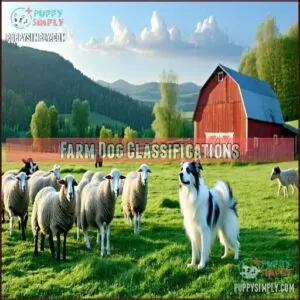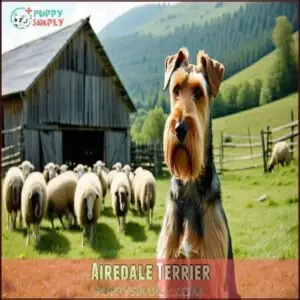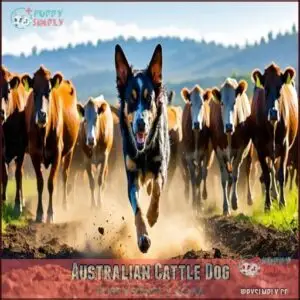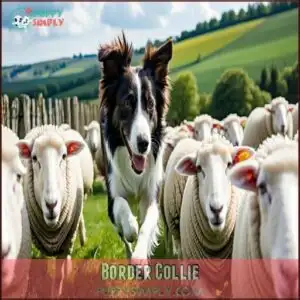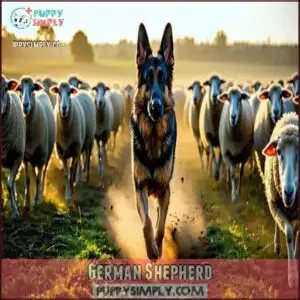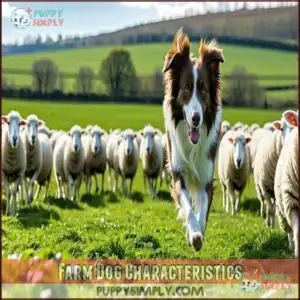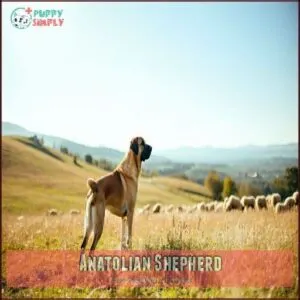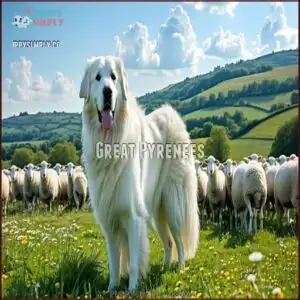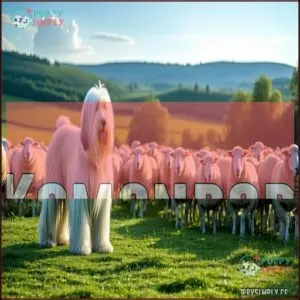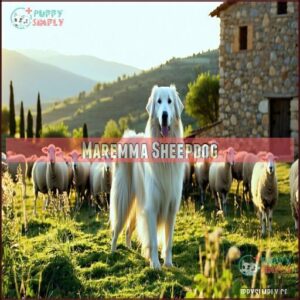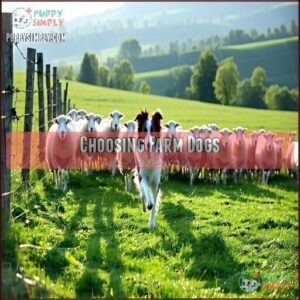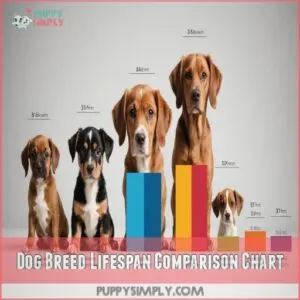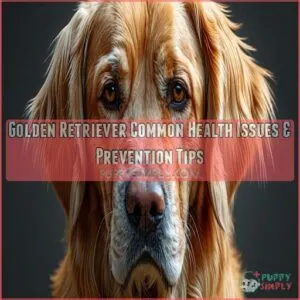This site is supported by our readers. We may earn a commission, at no cost to you, if you purchase through links.
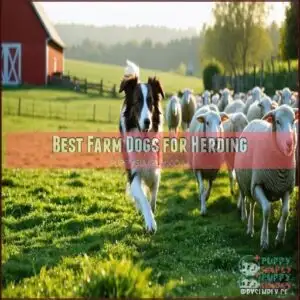 The best farm dogs are dependable, smart, and full of energy, making them perfect for herding livestock and keeping your farm running smoothly.
The best farm dogs are dependable, smart, and full of energy, making them perfect for herding livestock and keeping your farm running smoothly.
Border Collies stand out with their sharp minds and endless stamina, while Australian Cattle Dogs handle tough terrain like pros.
German Shepherds balance herding skills with protective instincts, and Airedale Terriers are versatile for various farm tasks.
These dogs thrive with early training and need plenty of work to keep them happy, and when picking a breed, think about your farm’s needs—whether it’s herding, guarding, or pest control.
The right dog can become your farm’s greatest asset.
Table Of Contents
- Key Takeaways
- Farm Dog Classifications
- Best Farm Dog Breeds
- Farm Dog Characteristics
- Top Guard Dog Breeds
- Choosing Farm Dogs
- Frequently Asked Questions (FAQs)
- What is considered the best farm dog?
- What is the best all around farm dog?
- What’s the best non-herding farm dog breed?
- What is the best dog to have on a farm?
- What kind of dog will keep coyotes away?
- What is the easiest farm dog to train?
- What is the best farm dog that won’t run away?
- What is the best rural dog?
- What type of dog will keep coyotes away?
- What is the best farm protection dog?
- Conclusion
Key Takeaways
- You’ll want to choose a farm dog that’s intelligent, energetic, and loyal, as these traits make them perfect for herding and other farm tasks, and with proper training, they’ll thrive on your farm.
- When selecting a breed, consider your farm’s specific needs, whether it’s herding, guarding, or pest control, and think about factors like the dog’s temperament, energy level, and training requirements to ensure they’re a good fit.
- You’ll find that different breeds excel in different areas, such as the German Shepherd’s versatility in herding and guarding, or the Anatolian Shepherd’s loyalty and protective instincts, so it’s key to research and understand the unique characteristics of each breed.
- To get the most out of your farm dog, you’ll need to provide proper training and socialization from an early age, including basic obedience and introduction to the farm environment and livestock, and you’ll also need to consider their specific needs, such as dietary requirements, exercise levels, and grooming needs.
Farm Dog Classifications
You’re looking for the best farm dogs for herding, and understanding farm dog classifications is a great place to start.
You’ll find that farm dogs are generally categorized into herding, guardian, varmint catching, and versatile breeds, each with unique characteristics and abilities.
Herding Dog Breeds
You’ll find several herding dog breeds suitable for farm work.
- Australian Shepherd
- Border Collie
cattle herding dogs, leveraging their Herding Instincts and Breed Energy for Livestock Compatibility with proper Training Techniques, considering Breed Health.
Guardian Dog Breeds
You’re looking for guardian dog breeds to protect your livestock.
Livestock guardian dogs, like Anatolian Shepherds, have strong guarding instincts, requiring proper training and territory size consideration to defend against predators and guarantee livestock protection.
Varmint Catching Breeds
You’ll need terrier breeds with Terrier tenacity for vermin control.
- Jack Russell Terrier
- Rat Terrier
- Airedale Terrier
- Fox Terrier
for effective pest control in your farm ecosystem, utilizing their ratting skills and breed instincts as ratters.
These breeds often display strong prey drive, making them excellent hunters.
Versatile Farm Dog Breeds
You’ll discover versatile farm dog breeds like German Shepherds, Dutch Shepherds, and Belgian Malinois, which excel in multi-purpose roles, showcasing breed adaptability.
| Breed | Role |
|---|---|
| German Shepherd | Herding |
| Dutch Shepherd | Guarding |
| Belgian Malinois | Protection |
| Catahoula | Herding |
Best Farm Dog Breeds
You’re looking for the best farm dog breeds to help with herding, and there are several options worth exploring.
When choosing a breed, you’ll want to think about factors like intelligence, athleticism, and temperament, as these traits will impact the dog’s ability to effectively herd and protect your livestock.
Airedale Terrier
Consider the Airedale Terrier, the largest of the terrier breeds, for farm versatility. You’ll find them useful because:
- They’re natural ratters.
- They herd livestock.
- Their loud bark protects.
Airedale Grooming is essential for their wiry coat. Terrier history shows their farm dog breeds’ aptitude for livestock driving.
Airedale Temperament makes them keen protectors. As working dog breeds, Airedale Terriers excel. If you’re exploring farm dogs, consider this dog breed.
Australian Cattle Dog
You’re considering the Australian Cattle Dog, also known as a Blue Heeler, for farm work.
This breed excels at cattle herding, using its nipping technique to guide animals, and is highly intelligent, energetic, and loyal, making it a great addition to your farm dog breeds, perfect for herding tasks.
Border Collie
You’re looking at the Border Collie, a top herding dog.
- Highly intelligent
- Strong herding instincts
- High energy levels
- Loyal family companion, making them one of the best herding dogs for farm work, with proper training techniques.
German Shepherd
You’ll find German Shepherds excel as farm work dogs, offering Shepherd versatility in herding, training, and temperament, with a rich Shepherd history, making them one of the best farm dog breeds for various tasks, including Shepherd health and farm dog training, suitable for farm work and protection.
These dogs also need consistent mental stimulation to stay happy and healthy.
They require this balance to thrive as a farm work dog.
Farm Dog Characteristics
You’re looking for a farm dog that can help with herding, and it’s vital to take into account the characteristics that make a dog well-suited for this task.
When evaluating farm dog characteristics, you’ll want to think about factors like intelligence, athletic ability, temperament, and size to find the best fit for your needs, considering complete concepts that make a dog suitable for herding.
Intelligence and Trainability
You’ll want farm dog breeds with high cognitive abilities, like Border Collies, known for problem-solving and quick learning, making them highly trainable, with adaptable learning styles, suited for various training methods.
Some owners explore options for herding dog enrichment, showcasing notable dog intelligence and trainability among farm dog breeds.
Athletic Ability and Stamina
You need farm dogs with endurance. Key aspects include:
- Daily Exercise
- Injury Prevention
- Endurance Training
- Breed Differences.
One example of a breed known for its stamina is the Australian Cattle Dog.
This guarantees sustained effort, reflecting dog athleticism and stamina, necessary for farm dog breeds, requiring consistent dog energy and exercise.
Temperament and Drive
A farm dog’s temperament and drive are shaped by its work ethic and breed instincts.
High energy levels and dog drive make these breeds ready for action but require outlets to prevent dominance issues or misbehavior.
Dog loyalty guarantees a bond that strengthens farm tasks, while trainability quirks demand patience.
Using positive reinforcement methods can help with training.
Balancing their bustling energy with thoughtful training releases their full potential.
Size and Breed Variations
Size and breed variations matter when choosing farm dog breeds.
Small farm dogs are agile and great for tight spaces, while larger breeds handle herding bigger animals.
Consider farm dog supplies for their well-being.
Pay attention to these details:
- Breed Height and Weight: Confirm it fits your farm’s needs.
- Coat Types: Some breeds resist harsh climates.
- Breed Purpose: Different sizes excel in specific tasks.
Top Guard Dog Breeds
In the context of protecting your livestock, you need a guard dog that’s both loyal and fearless.
Breeds like the Anatolian Shepherd and Great Pyrenees are known for their strength, intelligence, and ability to keep predators at bay.
Anatolian Shepherd
Anatolian Shepherds are unmatched in protecting livestock with their brave yet calm temperament.
Their climate adaptability makes them ideal in various environments.
These farm security dogs are highly independent, often managing territory without constant direction.
Early training is key to honing their natural guarding instincts, guaranteeing effective livestock protection.
| Feature | Description | Importance |
|---|---|---|
| Breed Temperament | Calm, protective, independent | Guarantees livestock safety |
| Training Needs | Requires firm guidance early | Builds guarding skills |
| Climate Adaptability | Thrives in diverse conditions | Broadens usability |
| Territory Management | Strong territorial instincts | Aids in farm security |
Great Pyrenees
The Great Pyrenees stands as a gentle giant among farm dog breeds.
Renowned for protecting livestock, these loyal guard dogs thrive in colder climates with their thick, fluffy coats.
They’re calm around family but alert to predators.
Pyrenees grooming keeps their coat stays clean.
Though stubborn, consistent training tackles challenges, making them exceptional companions and reliable protectors for farms of all sizes.
Due to their size, they’re also prone to joint and bone issues, so regular vet checks are vital.
Komondor
The Komondor, one of the standout farm dog breeds, is a powerhouse in livestock protection.
Its iconic corded coat shields against harsh weather and predators.
Known for its independent breed temperament, this guard dog excels at keeping flocks safe.
Early socialization needs are critical, as is proper training, making it a loyal family companion and a reliable addition to any farm.
Maremma Sheepdog
The Maremma Sheepdog stands out among farm dog breeds with its Italian heritage and fearless wolf deterrent abilities.
This breed is a natural livestock guardian and a dedicated family protector. Known for its breed temperament, it requires early training to thrive.
- Wolf Deterrent: Fearless against predators.
- Italian Heritage: Rooted in centuries of livestock guarding.
- Family Protector: Loyal and affectionate.
Choosing Farm Dogs
When choosing a farm dog, focus on traits that match your specific needs, like herding, guarding, or pest control.
Consider the dog’s temperament, energy level, and training requirements to guarantee they thrive in your environment.
Working Lines Vs Show Lines
When picking farm dog breeds, knowing differences between working lines and show lines helps.
Working lines prioritize function, excelling in tasks like herding through genetic predisposition.
Show lines conform to breed standards, favoring aesthetics and temperament traits suited for families.
| Feature | Working Lines | Show Lines |
|---|---|---|
| Performance Differences | High drive, task-oriented | Calmer, less intense |
| Genetic Predisposition | Functional skills | Visual traits |
| Health Concerns | Robust, varied | Focused on appearance |
The key differences between these lines are crucial for understanding the breed standards and the purpose of the dog, whether it’s for work or as a family pet.
Assessing Temperament
Evaluating dog temperament is key to picking the right farm helper.
Consider breed tendencies, individual variation, and early socialization to guarantee a good fit.
Watch for:
- Confidence without aggression
- Adaptability to farm life
- Trainability and focus
- Calmness around livestock
- Consistent energy levels
Temperament testing reveals farm dog characteristics, guiding you to the best dog breed temperament for your needs, which is crucial for a successful farm operation with a reliable dog.
Early Training and Socialization
Early puppy socialization builds trust and confidence in farm dog breeds.
Start with basic obedience to create a strong foundation. Gradually introduce the farm environment and livestock, teaching boundaries while preventing aggression.
Positive dog training methods encourage good behavior. Practice dog socialization skills regularly so they adapt to their role.
Proper training guarantees your dog thrives on the farm, with positive outcomes resulting from careful planning and execution.
Breed Specific Needs
When choosing farm dog breeds, consider their unique needs, including dietary requirements, exercise levels, and grooming needs.
Different breeds have distinct characteristics, such as health concerns and temperament, affecting their suitability as farm dogs.
So research their specific needs to guarantee the best fit for your farm.
Frequently Asked Questions (FAQs)
What is considered the best farm dog?
You’ll find the best farm dog is often the German Shepherd, due to its intelligence, loyalty, and strong herding skills, making it a versatile and valuable addition to your farm.
What is the best all around farm dog?
You’ll find the German Shepherd is often considered the best all-around farm dog due to its intelligence, loyalty, and versatility in herding, guarding, and protecting.
What’s the best non-herding farm dog breed?
You’ll find Anatolian Shepherds, Great Pyrenees, and Rottweilers excel as non-herding farm dogs, offering protection and guarding services with loyalty and intelligence, making them great additions to your farm.
What is the best dog to have on a farm?
You’re the captain of your farm, and the right dog is your trusty first mate.
Like an Anatolian Shepherd, guarding livestock with loyalty and intelligence, making your farm a safer haven.
What kind of dog will keep coyotes away?
You’ll want a dog like a Great Pyrenees, Anatolian Shepherd, or German Shepherd to keep coyotes away, as they’re naturally protective and alert.
What is the easiest farm dog to train?
You’ll likely find the German Shepherd is the easiest farm dog to train, given its high intelligence and loyal nature, making it a popular choice for herding and protection tasks.
What is the best farm dog that won’t run away?
You’ll want a breed like the Anatolian Shepherd, known for being loyal and less prone to wandering, making them a great choice for a farm dog that stays close.
What is the best rural dog?
Rural residents, you’re rooting for a reliable rural dog, consider the Australian Shepherd, a robust, rustic ranch hand, renowned for loyalty and protective prowess.
What type of dog will keep coyotes away?
You’ll need a guardian breed like Anatolian Shepherd or Great Pyrenees to keep coyotes away, as they’re naturally protective and alert.
What is the best farm protection dog?
You’ll find Anatolian Shepherds, Great Pyrenees, and German Shepherds excel as farm protection dogs, guarding livestock and property with loyalty and intelligence, making them top choices for farm owners.
Conclusion
Honestly, you’ll find the best farm dogs are intelligent, energetic, and loyal, making them perfect for herding.
You’re looking for the best farm dogs, and with proper training, they’ll thrive.
Consider your farm’s needs, and remember, the right breed will become your greatest asset, so choose the best farm dogs wisely.

